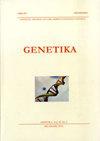Hypericum perforatum L. extracts exert cytotoxic effects and show different miRNA signatures in PC-3 and DU 145 prostate cancer cells
4区 农林科学
Q3 Agricultural and Biological Sciences
引用次数: 0
Abstract
Phytochemicals and bioactive substances derived from a wide range of plant extracts have been reported to exert various anticancer effects. Prostate cancer is one of the leading causes of cancer-related deaths within the male population. Prostate cancer-specific miRNA signatures were associated with cancer formation and progression, with various subtypes, and response to therapy. MicroRNA levels of expression were shown to change after the treatment of various compounds and substances extracted from natural products. Natural herbal compounds were shown to induce variations in miRNA expression levels in cancer cells. The aims of this study were to investigate the cytotoxic effects of methanol, ethyl-acetate, and hexane extracts obtained from branch-body part and flowers of Hypericum perforatum L. against humane PC-3 and DU 145 and to test potential miRNA-128/133b/155/193a/206/21/335 signature changes and differences between the two prostate cancer cell lines. Cytotoxic activity of H. perforatum extracts, their effects on cell cycle distribution, and miRNA expression levels were examined in humane PC-3 and DU 145 prostate cancer cells by MTT cell survival assay, flow cytometry, and quantitative real-time PCR. Hexane extract of flowers showed the strongest intensity of cytotoxic activity against PC-3 and DU 145 cells. The highest increase in the percentage of PC-3 cells in the subG1 phase was observed in cell samples treated with hexane extract of flowers and branch-body part. Significant differences in miRNA-128/133b/155/193a/206/21/335 levels were observed between PC-3 and DU 145 cell lines, especially in samples treated with flower extracts compared with the branch-body part. Conclusions: Investigated extracts have significant anticancer potential not only from the aspects of cytotoxicity and cell cycle effects but also from the aspect of lowering oncogenic or increasing tumor-suppressive miRNAs. The best effect might be the increase of tumor-suppressive miR-128 (accompanied by miR-193a) induced by the hexane extract of the flowers, which also exerted the highest cytotoxic activity. Hexane extract of flowers may be the candidate for further investigation for improving the efficiency of standard therapies for PCa. A miRNA signature might be cell-type specific after the treatment with H. perforatum extracts.贯叶连翘提取物对PC-3和DU - 145前列腺癌细胞具有细胞毒作用,并表现出不同的miRNA特征
从多种植物提取物中提取的植物化学物质和生物活性物质已被报道具有多种抗癌作用。前列腺癌是男性癌症相关死亡的主要原因之一。前列腺癌特异性miRNA特征与癌症的形成和进展、各种亚型和对治疗的反应有关。从天然产物中提取的各种化合物和物质处理后,MicroRNA的表达水平发生了变化。天然草药化合物被证明可以诱导癌细胞中miRNA表达水平的变化。本研究旨在研究贯叶连体部和花中甲醇、乙酸乙酯和己烷提取物对人PC-3和DU - 145的细胞毒作用,并检测潜在miRNA-128/133b/155/193a/206/21/335在两种前列腺癌细胞系间的特征变化和差异。采用MTT细胞存活法、流式细胞术和实时荧光定量PCR检测了贯叶连花提取物在人PC-3和DU 145前列腺癌细胞中的细胞毒活性、对细胞周期分布的影响以及miRNA表达水平。花己烷提取物对PC-3和DU - 145细胞的细胞毒活性最强。用花和枝体部分的己烷提取物处理的细胞样品中,PC-3细胞在亚g1期的百分比增加最多。在PC-3和DU 145细胞株中,miRNA-128/133b/155/193a/206/21/335水平存在显著差异,特别是花提取物处理的样品与枝体部分相比。结论:所研究的提取物不仅在细胞毒性和细胞周期作用方面具有显著的抗癌潜力,而且在降低致癌或增加肿瘤抑制mirna方面也具有显著的抗癌潜力。效果最好的可能是花的己烷提取物诱导的肿瘤抑制miR-128(伴随miR-193a)的升高,其细胞毒活性也最高。花的己烷提取物可能是进一步研究提高PCa标准治疗效率的候选物。经贯叶连翘提取物处理后的miRNA信号可能是细胞类型特异性的。
本文章由计算机程序翻译,如有差异,请以英文原文为准。
求助全文
约1分钟内获得全文
求助全文
来源期刊

Genetika-Belgrade
AGRONOMY-GENETICS & HEREDITY
CiteScore
1.80
自引率
0.00%
发文量
1
审稿时长
6-12 weeks
期刊介绍:
The GENETIKA is dedicated to genetic studies of all organisms including genetics of microorganisms, plant genetics, animal genetics, human genetics, molecular genetics, genomics, functional genomics, plant and animal breeding, population and evolutionary genetics, mutagenesis and genotoxicology and biotechnology.
 求助内容:
求助内容: 应助结果提醒方式:
应助结果提醒方式:


